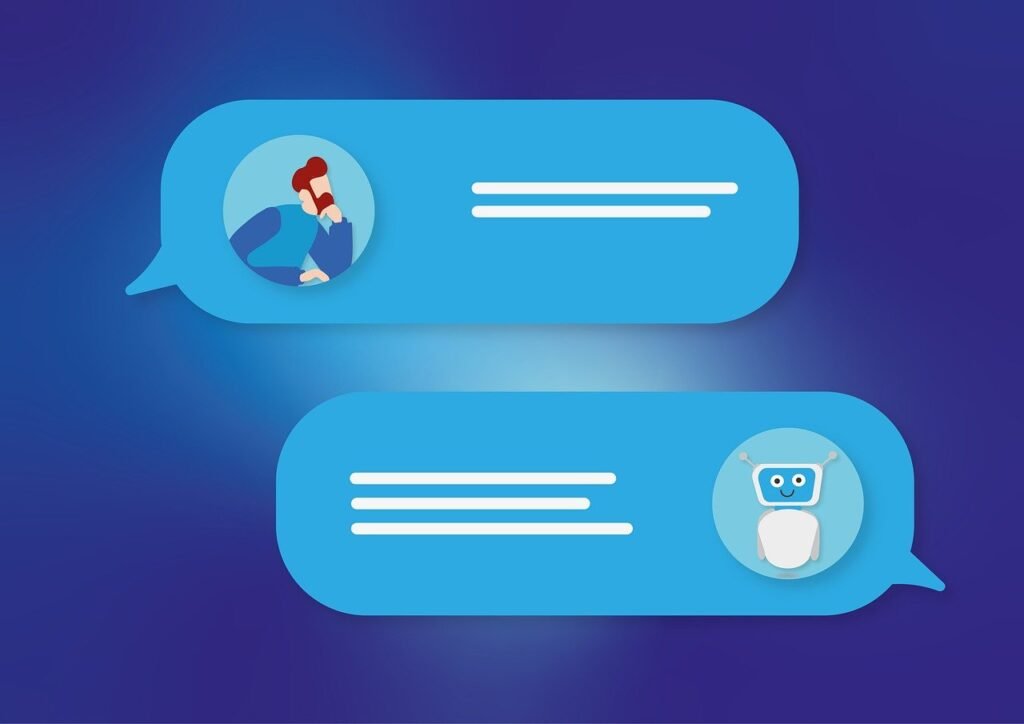Did you know that 64% of internet users like the 24/7 help from chatbots? This shows how important e-commerce chatbots are. They help over 2 billion online shoppers, making sure businesses can handle customer questions anytime1.
In today's fast-paced digital world, using chatbot platforms for e-commerce is key. It makes shopping better, boosts sales, and keeps customers engaged. This guide will look at how conversational AI helps in e-commerce, its perks, and the top platforms. We'll show you how to easily add these tools to your online store.
Key Takeaways
- • Chatbots provide 24/7 support, improving customer satisfaction.
- • Over 87% of customers find chatbots effective for solving problems.
- • Personalized experiences can increase consumer purchases by 80%.
- • Implementing chatbots can lead to an average 67% increase in sales.
- • Chatbots can significantly reduce cart abandonment rates.
- • E-commerce chatbots are essential for enhancing customer service efficiency.
Introduction to E-commerce Chatbots
E-commerce chatbots are advanced tools that mimic human conversations. They make online shopping better by helping customers and managing orders all day, every day. This constant support boosts customer happiness and loyalty, key in the competitive online world2.
The market for e-commerce chatbots is expected to hit $1.25 billion by 2025. This shows how important they are becoming3. Businesses are now using AI to make their customer service better. This lets support agents handle harder problems2. Using these tools saves time and money while improving service3.
Chatbots can cut down customer service needs by 80%. They can talk to many customers at once, giving quick answers and better experiences3. They also help keep more customers from leaving their carts, making shopping smoother4.
As shoppers' expectations grow, using chatbots is key for businesses to stay ahead. Choosing the right platform is important. Look for strong NLP, analytics, and customization2. Chatbots help solve customer problems well and quickly, building trust and loyalty in brands.
What Are Chatbot Platforms for E-commerce?
Chatbot platforms for e-commerce are special software for businesses to make and manage chatbots. They use advanced tech like conversational AI and natural language processing. This helps with automated order management and talking to customers.
Today, over two billion people shop online, showing a huge market and need for good communication tools5. Chatbots can talk like humans, answer questions, help with buying, and make shopping smooth. Businesses using chatbots can cut support costs by 30% and handle 80% of customer questions on their own5.
This lets businesses tackle harder issues, making them more efficient and happy customers. As e-commerce grows, Gartner says chatbots will be key for customer service by 20276. These platforms offer personalized experiences and work with important business systems like inventory and payments. They make transactions efficient and easy for users.
Benefits of Using E-commerce Chatbots
E-commerce chatbots are key in today's online shopping world. They offer many benefits that can greatly help your business. These chatbots make shopping smoother for your customers by improving customer engagement and automating tasks.
Enhancing Customer Engagement
E-commerce chatbots are great at improving customer interaction. They can talk to users in real-time, giving personalized product tips and quick answers7. Customers love getting help anytime, with most expecting 24/7 support8. This constant help boosts satisfaction and builds loyalty.
Reducing Cart Abandonment
Cart abandonment is a big problem in e-commerce, with rates near 70%. Chatbots can help by encouraging users to complete their purchases7. They can send reminders, share important product details, and offer discounts to help finish transactions8.
Automating Customer Service
Using chatbots for customer service makes things more efficient and lets businesses handle more questions. These smart virtual helpers can answer up to 80% of common questions on their own7. This frees up human customer service teams to focus on harder issues, saving costs and speeding up responses8.
How E-commerce Chatbots Improve Sales
E-commerce chatbots are changing how businesses talk to customers, boosting sales a lot. They use smart AI to give a personalized shopping experience that shoppers love. Chatbots look at what customers like and suggest things that fit their tastes, making more sales910.
Personalized Shopping Experience
AI chatbots help customers right away with what they need in online stores. They get what customers are asking for better than old chatbots. This makes shopping better and keeps more customers from leaving without buying, which was a big problem in 202211.
By making shopping easier and suggesting products that fit, chatbots keep customers interested.
AI-powered Sales Support
Chatbots act like virtual sales helpers, guiding customers from start to finish. They answer questions, share product info, and suggest other options, making shopping smooth and trustworthy9. Since 62% of people prefer chatbots for quick answers, they really improve customer service10.
Plus, chatbots work all the time, answering questions day and night, which is key in today's fast world11.

Key Features to Look for in Chatbot Platforms
Choosing the right chatbot platform for your e-commerce site is key. Look for features that boost customer happiness and make your business run smoother. Important ones include natural language processing, easy integration with your site, and the ability to chat across different channels.
Natural Language Processing Capabilities
Natural language processing lets chatbots understand and talk to customers like humans. This makes users feel more comfortable and happy. Studies show chatbots with this tech can increase sales by up to 67% and make customers much happier12.
Integration with E-commerce Platforms
It's important for chatbots to work well with your e-commerce site. This lets them handle orders and keep product info up to date. This makes shopping smooth for users. It also helps cut down on cart abandonment, which is a big problem for online stores13.
Omnichannel Engagement
Omnichannel chatbots can talk to users on websites, social media, and messaging apps. This makes it easy for customers to get help whenever they want. Good omnichannel chatbots can lead to more sales and happier customers12.
Best Chatbot Platforms for E-commerce
Choosing the right platform for your conversational AI needs is key to e-commerce success. Many platforms stand out, each with unique features for different business needs.
Overview of Popular Options
ChatBot, HubSpot, and Chatfuel are top choices for e-commerce chatbots. ChatBot offers strong automation tools. HubSpot is great for CRM system integration. Chatfuel is easy to use, perfect for small businesses wanting to improve customer service without needing tech expertise.

Criteria for Selection
When picking chatbot platforms for e-commerce, consider these factors:
- • Functionality: Make sure the platform can handle various customer interactions well.
- • Ease of Integration: Choose platforms that easily connect with your current systems.
- • Customer Support Features: Good support is key for fixing issues and getting the most out of the platform.
- • Scalability: The platform should grow with your business.
- • Pricing Structures: Compare costs to find a solution that fits your budget and meets your needs.
This careful selection ensures your platform matches your business needs and customer expectations. Over 50% of businesses using chatbots see higher-value baskets. By 2024, retail chatbot spending is expected to hit $142 billion14. This shows the big potential of the best chatbot platforms for e-commerce.
How to Implement Chatbots in Your E-commerce Store
Adding chatbots to your online store is a smart move. It makes talking to customers better and makes your store run smoother. First, decide what you want your chatbot to do. This could be to help customers more or to sell more stuff.
Then, pick the best platform for your needs. The chatbot market is big, with a value of $7.01 billion in 2024. Choosing a good service is key to using chatbots well15. Many platforms use artificial intelligence and natural language processing to help lots of customers at once. They offer quick help any time of day16.
After picking a platform, make your chatbot sound like your brand. This makes customers more likely to stick around and buy more. Chatbots have been known to increase sales by 67%, showing how much they can help15.
Make a plan for where your chatbot will help customers. This could be answering questions about products or helping after a sale. By working well with your sales, you can cut down on customers leaving without buying. This can drop by up to 30% with the right chatbot help15. Also, make sure your chatbot works with your CRM to help support customers and find new leads fast15.
In short, by setting goals, choosing the right platform, making your chatbot sound like your brand, and planning where it will help, you'll see big benefits. This is key to making your online store better.
| Key Steps | Description | Benefits |
|---|---|---|
| Define Goals | Establish clear objectives for your chatbot. | Aligns chatbot capabilities with business needs. |
| Select Platform | Choose a chatbot platform with robust capabilities. | Increase efficiency and improve customer interactions. |
| Customize Brand Voice | Adjust chatbot language and persona to reflect your brand. | Enhance engagement and customer loyalty. |
| Map Customer Touchpoints | Identify where the chatbot will assist customers. | Improves user experience and minimizes cart abandonment. |
| Integrate Systems | Ensure chatbot works with CRM and other tools. | Streamlines operations and boosts sales performance. |
With a careful plan for chatbots, you'll make your online store even better.
How Chatbots Handle Customer Queries
E-commerce chatbots are key in handling customer queries well. In 2022, 88% of customers talked to a chatbot, and 70% were happy with it17. They offer support 24/7, answering questions even when the store is closed. This makes customers very happy18.
Chatbots deal with simple questions like shipping and product availability. This makes the service better for everyone18.
AI chatbots answer fast, thanks to advanced algorithms. They even suggest products based on what you've looked at before. This makes customers more likely to buy again, with a 78% chance17.
Businesses with chatbots can give quick, personalized answers. This makes customers feel understood and valued19.
Chatbots can talk in many languages, helping businesses reach more people. They get better over time, learning what customers like. This helps them offer the right products or services19.
They work well with other platforms, providing consistent service. This makes shopping smoother and more efficient18.
Analyzing the Performance of Your Chatbot
It's key to check how well your chatbot works to boost your online store. You can do this by watching different metrics and tweaking things based on what the data shows.
Monitoring Customer Interactions
To keep an eye on how customers interact, look at things like how often they chat, how long they talk, and how happy they are (CSAT score). These numbers help you see how well your chatbot is doing. A lot of people, 70%, like talking to chatbots more than live people, showing how popular they are20.
Also, check how fast your chatbot answers and how well it helps sell things21. Using tools like Google Analytics can help see how your chatbot affects sales and user behavior21.
Improving Chatbot Responses
It's important to keep making your chatbot better to stay ahead. Try out different ways of talking and see how people react21. Asking customers for their thoughts can also help you know what they like and don't like, so you can make it better21.
By doing this, you can help your sales grow. Chatbots are becoming more important in online shopping, with 80% of businesses planning to use them for marketing soon20.
Using special tools for chatbot data can give you detailed reports on how well it's doing. This helps you make the most of your chatbot. Always be looking to improve and you'll see better results, like more people coming back to buy things22. This effort is crucial to keep up in the online shopping world202122.
Future Trends in E-commerce Chatbots
The world of e-commerce chatbots is changing fast. This is thanks to new AI tech and what customers want. Soon, a quarter of businesses will use chatbots to talk to customers, showing a big change in how we interact23. With chatbots, online shopping is expected to hit $142 billion by the end of this year. This shows how important chatbots are for online stores23.
Personalization is a big deal for chatbots in the future. They can give users shopping tips that really help. This is because personalized tips can make a store 40% more money24.

Voice technology and chatbots are also getting a lot of attention. Voice shopping was worth $40 billion recently. This shows how voice assistants are changing how we buy things24. Together, voice tech and e-commerce chatbots will make shopping smoother and easier. This is key for staying ahead in the market.
Also, chatbots will give businesses valuable insights. For example, H&M used chatbot data to sell 15% more. They did this by managing stock better and marketing smarter23. This shows chatbots will soon help make big business decisions, not just talk to customers.
In short, the future of e-commerce chatbots looks bright. With better tech, we'll see more personal shopping, more voice shopping, and smarter business choices from chatbots.
Challenges in Implementing Chatbots
Adding chatbots to your e-commerce site can bring unexpected problems. Many face big challenges in implementing chatbots. This makes switching from old customer service methods hard. Knowing these common issues helps make the transition smoother.
Common Issues Faced by Businesses
Some main challenges in using chatbots include:
- • It's hard to connect them with current systems, which can mess up work.
- • They lack the personal touch and empathy, making customers unhappy when problems come up.
- • They can't handle complex issues, making customers frustrated.
- • There are tech problems that can cause downtime or make things run slow.
- • There are worries about keeping customer data private and ethical concerns.
More than 75% of online shopping site interactions are complaints or concerns. This shows how key it is to answer customer questions well with your chatbot25. Chatbots offer 24/7 support, making sure no question is left unanswered26. They can also deal with lots of questions fast, which is better than updating whole websites25. These systems help guide shoppers through their buying journey by talking to visitors on e-commerce sites25.
Improving how chatbots understand natural language is key to solving user query challenges. Using advanced NLP algorithms can make chatbots work better. This is crucial for a good customer experience27.
Conclusion
In today's fast-changing digital world, using chatbot platforms for e-commerce is key. Brands have seen a 92% rise in using chatbots, showing how they boost customer experience28. These tools help with customer service and cut down on cart abandonment, saving billions of dollars each year28.
Chatbots can handle 80% of customer questions, freeing up your team to do more important work. This makes your business more efficient28.
By using these advanced technologies, you stay ahead of your rivals. The e-commerce market is expected to hit $6.3 trillion in 202428. Tools like LivePerson and ManyChat offer different ways to connect with customers29.
Putting a focus on customer experience through automation can increase profits by 60%. This is much higher than businesses that don't focus on it28.
As you look ahead, remember the importance of choosing the right chatbot solutions. They are crucial for conversational commerce. By using e-commerce automation, you can make the customer journey better and more engaging29.
This prepares your business for success now and in the future of e-commerce.




